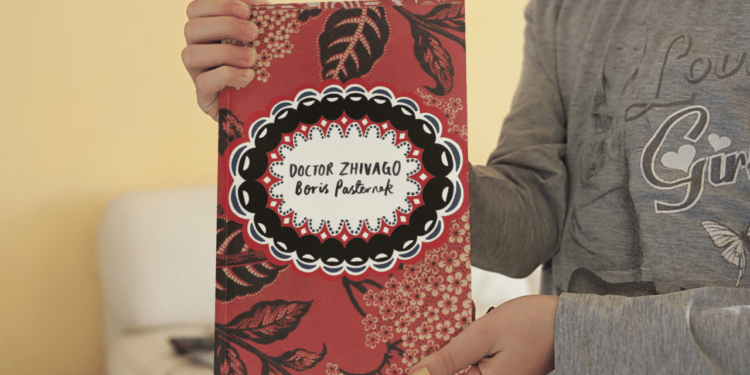Boris Pasternak, one of the most enigmatic and influential figures in Russian literature, left an indelible mark on the world with his captivating writing. Born on February 10, 1890, in Moscow, Pasternak’s literary journey began amidst a backdrop of political and social upheaval.
His talent and unique perspective allowed him to navigate the complexities of his time, creating works that would resonate with readers for generations to come.
Boris Pasternak’s Early Life and Background
Pasternak’s early life was filled with a rich tapestry of experiences that would shape his worldview and influence his writing. He was born into a family of artists, with his father, Leonid Pasternak, being a well-known painter and his mother, Rosalia Kaufman, a concert pianist. Growing up in an environment steeped in creativity, Pasternak developed a deep appreciation for the arts from a young age.
Despite his privileged upbringing, Pasternak was not shielded from the challenges that life had to offer. He witnessed the turbulent times of the Russian Revolution and the subsequent civil war, which had a profound impact on his perception of the world. These experiences would find their way into his writing, adding depth and authenticity to his works.
Boris Pasternak’s Writing Career
Pasternak’s writing career began in the early 1910s when he started publishing his poems. His unique style and ability to capture the essence of human existence quickly garnered attention from both readers and critics alike. His early works explored themes of love, nature, and the human condition, showcasing his profound understanding of the complexities of life.
As his career progressed, Pasternak ventured into prose, with his first novel, “The Childhood of Luvers,” published in 1917. This marked the beginning of a prolific period for the author, where he would go on to write numerous novels, short stories, and plays. His works delved into a wide range of topics, from personal relationships to political ideologies, always pushing the boundaries of literature.
Boris Pasternak’s Controversial Novel: Doctor Zhivago
One of Pasternak’s most controversial and widely acclaimed works is his novel “Doctor Zhivago.” Published in 1957, the novel tells the story of Yuri Zhivago, a physician and poet, and his experiences during the Russian Revolution and its aftermath. The novel explores themes of love, betrayal, and the struggle for personal and artistic freedom.
“Doctor Zhivago” faced heavy criticism from the Soviet authorities due to its portrayal of the Russian Revolution and its characters. The novel was initially banned in the Soviet Union, but it gained international recognition and was eventually awarded the Nobel Prize in Literature in 1958. The novel’s success, both in Russia and abroad, solidified Pasternak’s status as a literary icon.
Boris Pasternak’s Personal Life: Love, Friendships, and Relationships
Beyond his literary achievements, Pasternak’s personal life was filled with love, friendships, and complicated relationships. He had numerous romantic affairs throughout his life, some of which inspired his writing. His most significant relationship was with Olga Ivinskaya, his muse and companion for many years. Their love story became the inspiration for the central romance in “Doctor Zhivago.”
In addition to his romantic relationships, Pasternak had deep friendships with fellow writers and artists, including Marina Tsvetaeva and Rainer Maria Rilke. These connections served as sources of inspiration and intellectual stimulation, shaping his creative process and contributing to the richness of his works.
Boris Pasternak’s Influence on Literature and Other Artists
Pasternak’s impact on literature extends far beyond his own works. His unique writing style and philosophical insights continue to inspire writers and artists around the world. His ability to capture the essence of human emotions and experiences resonates with readers of all generations.
Furthermore, Pasternak’s courage to challenge the status quo and express his own truths in the face of criticism has served as an inspiration to countless writers. His unwavering commitment to artistic freedom and the pursuit of truth is a testament to the power of literature as a catalyst for change.
Boris Pasternak’s Books and Their Adaptations in Movies and Media
Many of Pasternak’s books have been adapted into movies and other forms of media, further cementing his legacy in popular culture. “Doctor Zhivago,” in particular, has been adapted multiple times, most notably in the 1965 film directed by David Lean. The movie brought Pasternak’s story to a wider audience, capturing the essence of his literary masterpiece on the silver screen.
Other works by Pasternak, such as “Safe Conduct” and “The Last Summer,” have also been adapted into films, showcasing the enduring appeal of his stories. These adaptations not only introduce new audiences to Pasternak’s works but also provide fresh interpretations of his narratives, breathing new life into his timeless tales.
Exploring Boris Pasternak’s Famous Quotes
Throughout his writing career, Boris Pasternak crafted numerous thought-provoking and memorable quotes that continue to resonate with readers. Here are a few of his most notable quotes:
- “I don’t like people who have never fallen or stumbled. Their virtue is lifeless and it isn’t of much value. Life hasn’t revealed its beauty to them.”
- “Art is a form of catharsis.”
- “We don’t love people so much for the good they’ve done us, as for the good we’ve done them.”
- “Art has two constant, two unending concerns: It always meditates on death and thus always creates life. All great, genuine art resembles and continues the Revelation of St John.”
These quotes offer a glimpse into Pasternak’s profound understanding of human nature and his ability to convey complex emotions through his writing.
Must-Read Books by Boris Pasternak
To truly appreciate Boris Pasternak’s literary genius, there are several books that should be at the top of every reader’s list. Here are some must-read books by Pasternak:
- “Doctor Zhivago” – This epic novel is a masterpiece of Russian literature, exploring themes of love, revolution, and personal identity.
- “Safe Conduct” – A collection of Pasternak’s poetry, this book showcases his mastery of language and his ability to evoke powerful emotions through his words.
- “The Last Summer” – A poignant novella that delves into the complexities of love and loss, this book is a testament to Pasternak’s ability to capture the intricacies of human relationships.
These books serve as a testament to Pasternak’s literary prowess and his ability to delve into the depths of the human soul with profound insight and sensitivity.
Exploring the Settings of Boris Pasternak’s Books
One of the unique aspects of Pasternak’s writing is his vivid portrayal of settings. His books are often set in locations that hold deep significance and serve as metaphors for the characters’ experiences. Here are some of the main places where Pasternak’s books are set:
- Moscow – Pasternak’s birthplace and a recurring setting in his works, Moscow represents the complexities of Russian society and serves as a backdrop for his characters’ journeys.
- Siberia – Often depicted as a harsh and unforgiving landscape, Siberia symbolizes the hardships and challenges faced by Pasternak’s characters.
- The Russian countryside – Pasternak’s descriptions of the Russian countryside evoke a sense of nostalgia and tranquility, contrasting with the tumultuous events unfolding in his narratives.
By immersing readers in these settings, Pasternak creates a multi-dimensional experience that enhances the richness of his stories.
The Life of Boris Pasternak Outside of Writing
While Boris Pasternak is primarily known for his literary achievements, his life outside of writing was just as fascinating. Despite facing criticism and backbiting from his peers, Pasternak remained true to his artistic vision, refusing to compromise his integrity for the sake of popularity. He lived a life driven by his passion for literature and his unwavering commitment to artistic freedom.
In his personal life, Pasternak experienced both financial struggles and moments of prosperity. He often faced criticism for his political views and was subjected to constant scrutiny by the Soviet authorities. However, his dedication to his craft and his refusal to conform to societal expectations allowed him to transcend these challenges, leaving a lasting impact on the literary world.
Conclusion: Boris Pasternak’s Legacy and Continued Influence
Boris Pasternak’s legacy as a literary icon continues to thrive, decades after his passing. His unique perspective, profound insights, and unwavering commitment to artistic freedom have made him a source of inspiration for writers and artists around the world. His ability to capture the complexities of the human experience and the beauty of the written word ensures that his works will be cherished for generations to come.
As we delve into the pages of Pasternak’s books, we are transported to a world filled with love, passion, and profound introspection. His words have the power to move us, to challenge us, and to inspire us to seek the truth within ourselves. Boris Pasternak’s impact on literature and the arts is undeniable, and his legacy will continue to shine brightly, reminding us of the enduring power of storytelling.
Enjoyed what you read? Show your support and fuel our fight by treating us to a coffee or purchasing captivating books of Boris Pasternak on Amazon via this link.
The WFTS crew is fuelled by a fervent desire to safeguard the timeless allure of books, ensuring it never fades in the glare of the big screen.
We’re committed to presenting our work without the distraction of irrelevant and irksome banner ads.
Join us in this modern revolution to uphold the enduring magic of transmuting cherished books into Movies and TV shows










